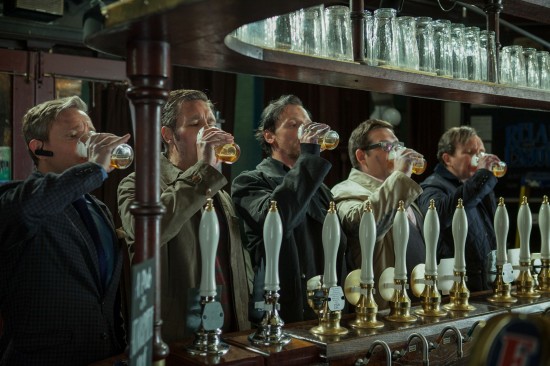Who else but Edgar Wright can draw so much pathos and emotion from almost nothing at all? “Nothing” in the sense that when his best films Shaun of the Dead, Hot Fuzz, and now, The World’s End jerk you into seriousness, you’re surprised by how you care about the characters – before then it’s been joke after joke, and somewhere along the way, or perhaps all during it, they’re endearing themselves. Since he’s been able to do it twice before, it’s not a fluke; it’s a skill, and a damn good one.
I’m still not entirely sure how he does it, but I do know that he doesn’t pause every other moment for some dubious self-reflection, and he makes a lot of character-based jokes – that is, jokes that are funny within the context of the character telling them. He also drops clues here and there so that when the tonal shift comes, it’s a payoff instead of a distraction – more importantly, it means something.
Vague enough? Well, whatever it is that Edgar Wright’s able to do and do well, The World’s End is the best display of that yet – in addition to being a very funny movie.
The story proper follows Gary King (Simon Pegg), a man inches away from full-on dereliction who opens with a story of the greatest night of his life. We see VHS-style grainy flashbacks to the early ’90s when Gary and his crew attempted the Newton Haven Golden Mile – a 12-pub crawl that no man survived, or at least conquered. Gary gave up after the ninth and went to watch the sunrise. As he glows in nostalgia, the camera zooms out to show the people Gary’s telling his story to, and it’s a very big laugh.
Anyway, one points out that even though that may have been the best night of Gary’s life, he still didn’t complete his crawl, and thus the plot is laid: Gary is determined to regroup the others – Peter (Eddie Marsan), Oliver “O-Man” (Martin Freeman), Steven (Paddy Considine), and Andrew (Nick Frost), who, from some past event that’s always hinted at, wants nothing to do with Gary – and conquer the Golden Mile – at the very end of which is the literal World’s End pub (and it goes without saying that all the other wonderfully named pubs have double meanings). And of course, all of his mates have gone on to far better and more meaningful things and tend to regard Gary with the kind of caution you’d give your racist uncle when he shows up after a year-long bender, asking for cash.
Fans of Wright’s previous films will recognize many of the faces, the callback visual gags; some musical cues; and most everyone will laugh. Pegg is given nearly all the lines, and he sells them with a charm that’s infectious but still keeps you on your guard. Slowly, through Gary’s goading and simply being back among seasoned friends, the old dynamic and attractions to so and so’s sister return.
Bygone injustices are brought up and petty arguments reignited, and they’re made all the more insignificant by the world that’s left them far behind. There’s a moral buried on the surface here, but either beneath or above that, it’s just fun to watch these people together, talking about old times and inanities and placed outside of their comfort zone.
The difficulty in talking about World’s End is that the most interesting aspect is the thing that sounds the most boring in review. The jokes have a resonance beyond merely the laughter. For example, when the boys show up at the first bar, they slowly realize it’s been bought out by a franchise – the beer’s cheap; the look’s bereft of any personality; and the bartender’s never heard of them. They head to the next bar and…well, I can’t spoil the joke, but the two together tie into both the more immediate story and also the theme of the film.
Perhaps it’s just best to say that it’s more mature than than its predecessors in Wright’s “Three Flavours Cornetto Trilogy,” the characters are stronger, and it’s just as funny.

